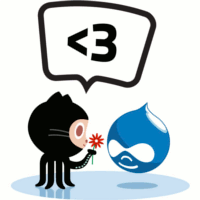Allows automatically to display module's README file on the admin/help/your_module page. Provides markdown ↗ text filter for creating text formats.
Tip: you can see this file in your browser by clicking the admin/help# link at the right of the Admin toolbar and then the admin/help/readmehelp# link in the list.
Forget about implementing hook_help() in your_module.module file. Just
write a decent README file with all information required and see it looking
almost the same both on the admin/help/your_module page as well in your text
editor. No more hardly to read (and to write!) markup intermingled with an
actual user help text. All that you need is just to add the readmehelp
dependency in your_module.info.yml and spend a couple of minutes learning the
basics of the markdown syntax:
- admin/help/readmehelp#usage
- admin/help/readmehelp#markdown-special-symbols
- admin/help/readmehelp#bold-and-italic-text
- admin/help/readmehelp#blockquote-and-cite
- admin/help/readmehelp#lists
- admin/help/readmehelp#anchor
- admin/help/readmehelp#image
- admin/help/readmehelp#horisontal-rule
- admin/help/readmehelp#headings
- admin/help/readmehelp#allowed-html-tags
- admin/help/readmehelp#dynamic-php-snippets
- admin/help/readmehelp#markdown-text-filter
- admin/help/readmehelp#advanced-readme-help
- admin/help/readmehelp#module-author
- README Help on drupal.org ↗
- README Help on github.com ↗
Open your_module.info.yml file and make it dependent on the readmehelp
module:
name: Your Module
type: module
description: Does awesome things.
core: 8.x
dependencies:
- readmehelpThen, if your_module is already installed on the site, just flush the caches.
If it's not, then the readmehelp will be installed automatically along with
your_module. That's it. You may skip further reading if you are already
familiar with markdown syntax or your_module help does not require complex
data compiling or multi-page help.
The README Help module's markdown syntax is a subset of the Github Flavoured Markdown syntax. Whenever possible the module attempts to replicate the look and feel of a Github repository's README file. Still, you may notice differences in some places of the admin/help/readmehelp# or on the module's Github repository.
The markdown "tag" special symbols:
- The asterisk: *
- The backtick: `
- The dash: -
- The underscore: _
- The line leading hash: #
- The line leading greater than symbol: >
- The line leading two greater than symbols: >>
- The line leading three and more symbols set: ___
- The line leading three and more symbols set: ***
- The line leading three and more symbols set: ---
- The line leading three and more symbols set: ===
- The markdown anchor: []()
- The markdown image: ![]()
- The markdown unordered list item: - ITEM
- The markdown ordered list item: 1. ITEM
If it is required to display markdown symbol as a regular character then the backslash should be prepended to a symbol: \SYMBOL.
**Bold**
...converted into:
Bold
__Bold__
...converted into:
Bold
*Italic*
...converted into:
Italic
_Italic_
...converted into:
Italic
> My Blockquote
...converted into:
My Blockquote
>> My Cite
...converted into:
My Cite
Note that every blockquote or cite can be referenced directly both locally and
externally by using the clickable greater than (>) sign at the left of a
block.
- ITEM
...converted into:
- ITEM
1.\ ITEM
...converted into:
- ITEM
Relative path:
Notice hash (#) signs in the url.
[admin/reports/dblog#](#0 "Reports")
...converted into:
Note that on the github.com the link above will work just as a dummy link.
Absolute path:
[PHP](http://php.net "On Hover Title")
...converted into:
Note that any raw text url, like http://php.net will be converted into:
Relative Path:

...converted into:
Absolute Path:

...converted into:
See origin of the above image: https://octodex.github.com/images/drupalcat.jpg
Three or more undescores like:
___
...converted into:
Three or more asterisks like:
***
...converted into:
Three or more dashes like:
---
...converted into:
Every heading can be referenced directly both locally and externally by using the clickable hash (#) sign at the left of a heading.
# H1
Alternative H1
==============
## H2
Alternative H2
------------ -
### H3
#### H4
##### H5
###### H6
Note that
# H1andAlternative H1syntax can be used just once at the very beginning of the file. So, demoing this heading is not possible here.
...converted into:
Besides the markdown a restricted set of HTML tags can be used for building README Help files:
- a
- em
- strong
- cite
- blockquote
- code
- ul
- ol
- li
- dl
- dt
- dd
- img
- h1
- h2
- h3
- h4
- h5
- h6
- p
- pre
- hr
- table
- tr
- td
- div
- span
Also, HTML Entities and HTML comments are supported.
To insert higlighted snippet of any existing on a Drupal site PHP file you need to construct a token like the following:
@PHPFILE: modules/contrib/readmehelp/readmehelp.module LINE:26 PADD:7 :PHPFILE@
...or just:
@PHPFILE: readmehelp.module LINE:26 PADD:7 :PHPFILE@
The absolute or relative path to a file may be followed by a LINE number argument and PADD, which is the number of lines to add before and after the LINE (additionally highlighted with yellow color). Both arguments are optional. If no PADD is passed then the default 10 lines will be added. If no LINE is passed then a whole highlighted file will be returned. There is a replacement of the token above (on the github.com shown as a raw token):
@PHPFILE: readmehelp.module LINE:26 PADD:7 :PHPFILE@
README Help module has its own filter/tips#readmehelp-filter which could be used for creating admin/config/content/formats#. So, users can implement easy to remember syntax for making their posts richer while not able to harm a site, whether intentionally or not.
Note that no any of the external libraries are used by the filter.
There might be cases when you still need to implement hook_help() and at the
same time leverage the power of the README Help module. To restore the default
behaviour you need additionally to implement dummy your_module_readmehelp()
which disables automatic rendering of your module's README file and instead
calls the regular your_module_help().
Copy the code from the snippet below, insert it into your_module.module file
and edit for your needs.
@PHPFILE: your_module.module.example LINE:33 PADD:33 :PHPFILE@
Vlad Proshin (drugan)
[proshins@gmail.com](proshins@gmail.com)
[https://drupal.org/u/drugan](https://drupal.org/u/drugan)
